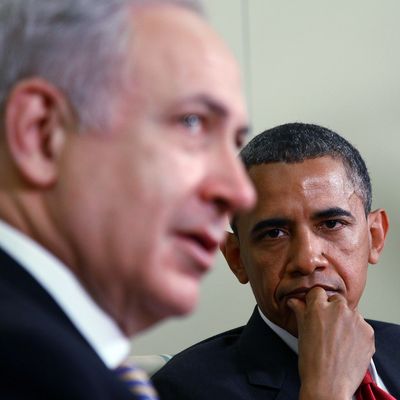
The endless ethno-nationalist conflict in American politics has, of late, revolved around two related dramas. One is a debate over President Obama’s patriotism, or Christianity, or alleged lack thereof. Another is a debate over Israeli Prime Minister Benjamin Netanyahu’s speech before Congress. Neoconservative activist and intellectual William Kristol brings the two episodes together in a fit of inadvertent insight, arguing in the same column that “Giuliani had struck a nerve,” and that Netanyahu is “more of an America-lover than Barack Obama.” Yes, that’s right. Kristol is simultaneously impugning the patriotism of the president of the United States and comparing him unfavorably to a foreign leader. Because the tension between these two beliefs has not even occurred to him, Kristol has brought together two arguments conservatives needed to keep apart.
The idea underlying Giuliani’s remarks — to the extent they expressed an idea at all, rather than racialized panic — is that true patriotism means loving your country as it is. This stands in contrast to liberal patriotism, which Obama and several previous Democratic presidents have expressed, which combines a love for country with a desire to bring its practices more closely into line with its ideals.
Of course, since ideals are never fully located within any country, conservative patriots tend to disdain liberal ones as faint-hearted cosmopolitans, lacking sufficiently deep-rooted loyalty. The right-wing patriotism is therefore traditionally hostile to minorities, who are seen as altering their country’s traditional makeup. This sort of patriotism can be directed against African-Americans, who (despite their long history in America) are suspected, not always without reason, of grievances that might weaken their loyalty. It is also directed against Jews, who are suspected of cosmopolitanism or dual loyalty.
The Netanyahu controversy presents the right-left struggle in a very different context. Here conservatives are arguing, as liberals often do, that dissent is the highest form of patriotism. They are defending the right of a foreign leader to interfere with American foreign policy in a way that would be unimaginable if, say, Congressional Democrats had invited the French president to argue in 2003 against the Iraq War. Here conservatives are embracing a cosmopolitanism so broad they feel unembarrassed at conspiring with a foreign country to undermine their own country’s negotiations. They love America just as it is, except of course for the president and the majority that twice elected him.
Kristol detects no contradiction here. He disdains Obama as a rootless cosmopolitan (“Obama is very much in the mainstream of modern progressive thought in his embrace of cosmopolitanism and his distrust of nationalism”). In the next paragraph, he praises Netanyahu as a true lover of Americanism. (“Netanyahu, by contrast, is a patriot and a nationalist. He’s an Israeli patriot and nationalist. But he also appreciates the historic role and accomplishments of the great nation-states of the West.”) Netanyahu is the one who truly loves America. He loves it enough to stand up and tell it when it has gone horribly wrong.






























